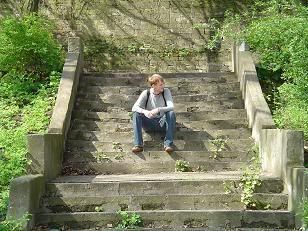 So I fell down on the job about making a last post from Russia. Nonetheless, the trip back to Moscow was smooth, and for the most part the trip home was as easy as might be expected, given the joys of flying anywhere from any New York airport on any given rainy day. (N.b., Southwest is pretty awesome.)
So I fell down on the job about making a last post from Russia. Nonetheless, the trip back to Moscow was smooth, and for the most part the trip home was as easy as might be expected, given the joys of flying anywhere from any New York airport on any given rainy day. (N.b., Southwest is pretty awesome.)When I finally hit the ground in Louisville, I had an excellent welcoming committee, pictured:
Jet lag, I think, has been more or less conquered: I managed to survive a trip the next day to Cincinnati for a Reds game (Go Redlegs!) without falling asleep once!







































